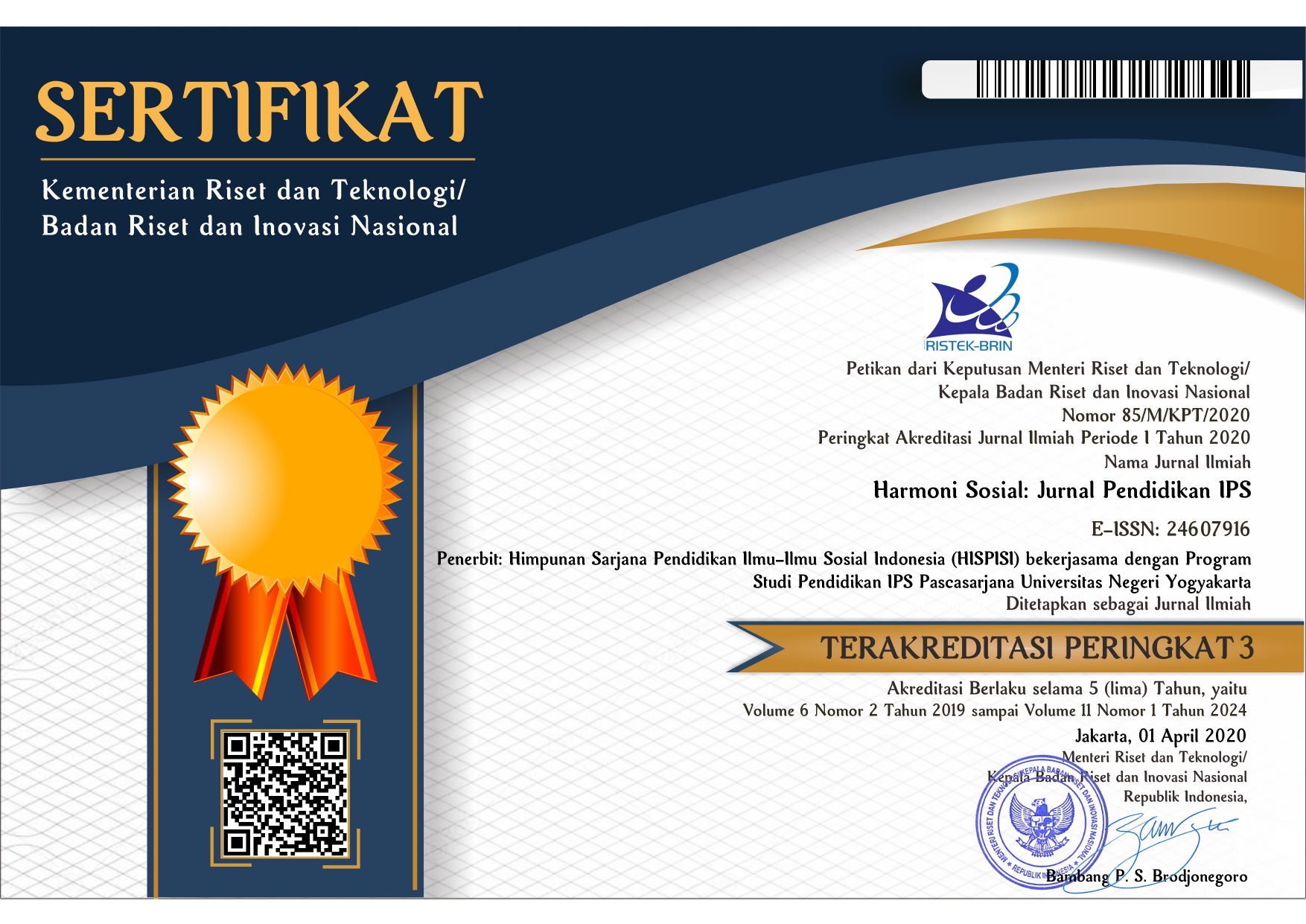Keefektifan pendekatan saintifik model problem based learning, problem solving, dan inquiry dalam pembelajaran IPS
Muchsinatun Siasah Masruri, Universitas Negeri Yogyakarta, Indonesia
Abstract
Penelitian ini bertujuan untuk mengetahui perbedaan keefektifan antara pembelajaran: (1) antara model Problem-Based Learning, Problem Solving, dan Inquiry; (2) model Problem-Based Learning dan model Problem Solving; (3) model Problem-Based Learning dan model Inquiry; dan (4) model Problem Solving dan model Inquiry. Penelitian ini menggunakan metode penelitian kuantitatif jenis eksperimen semu dengan posttest-only control group design yang sudah dimodifikasi sesuai dengan quasi-experimental research. Pengumpulan data menggunakan cara dokumentasi yaitu berupa jumlah peserta didik, nilai rapot sebagai skor awal, perangkat pembelajaran, dan tes hasil belajar. Analisis data menggunakan one way anava pada taraf signifikansi 0.05. Hasil penelitian menunjukkan bahwa, pembelajaran dengan menggunakan pendekatan saintifik model Problem-Based Learning, Problem Solving, dan Inquiry terdapat perbedaan keefektifan. Hasil analisis yang menyatakan hipotesis nihil diterima hanya terdapat dalam pengujian hipotesis yang kedua, yakni tidak terdapat perbedaan keefektifan pendekatan saintifik dengan model Problem-Based Learning dan Problem Solving; sedangkan pengujian hipotesis ketiga menunjukkan terdapat perbedaan keefektifan pendekatan saintifik model Problem-Based Learning dan Inquiry; hepotesis keempat menunjukkan terdapat perbedaan keefektifan pendekatan saintifik model Problem Solving dan Inquiry.
Kata kunci: keefektifan pendekatan saintifik, PBL, PS, Inquiry
THE EFFECTIVENESS OF SCIENTIFIC APPROACH OF PROBLEM BASED LEARNING, PROBLEM SOLVING, AND INQUIRY IN TEACHING AND LEARNING SOCIAL STUDIES
Abstract
This research aims to reveal: (1) the differences among Problem-Based Learning, Problem solving, and Inquiry; (2) the effectiveness of Problem-Based Learning and Problem Solving model; (3) the effectiveness of Problem-Based Learning and Inquiry model; and (4) the effectiveness of Problem Solving and Inquiry model. This research was quantitative research with quasi experiment as a method. It used the post test-only control group design modified in accordance with the quasi-experimental reseacrh. The research data were obtained through documentation of the number of learners, raport book score as the initial score, learning devices, and evaluation. The data analysis technique was one way ANOVA at the significance level of 0.05. The results show that there is a significance difference in learning by using the scientific approach of Problem-Based Learning, Problem Solving, and Inquiry. The null hypothesis is accepted in the second hypothesis testting. There is no effectiveness difference in the scientific approach with the model of Problem-Based Learning and Problem Solving; in the third hypothesis testing, there is an effectiveness difference in the scientific approach with the model of Problem-Based Learning and Inquiry; and in the fourth hypothesis testing, there is an effectiveness difference in the scientific approach with the model of Problem Solving and Inquiry.
Keywords: the effectiveness of scientific approach, PBL, PS, Inquiry
Keywords
Full Text:
Fulltext PDFReferences
Abdi, A. (2014). The effect of inquiry-based learning method on students’ academic achievement in science course. Universal Journal of Educational Research, 2(1).
Arikunto, S. (2015). Dasar-dasar evaluasi pendidikan. (2nd Ed.). Jakarta: Bumi Aksara.
Balim, A., G. (2009). The effects of discovery learning on students’ success and inquiry learning skills. Egitim Arastirmalari-Eurasian Journal of Educational Research, 35.
Mardapi, D. (2012). Pengukuran penilaian & evaluasi pendidikan. Yogyakarta: Nuha Litera.
Gok, T & Silay, T. (2010). The effects of problem solving strategies on students’ achievement, attitude and motivation. Lat. Am. J. Phys. Educ. 4(1).
Hillman, W. (2003). Learning how to learn: problem based learning. Australian Journal of Teacher Education, 28(2).
Huda, M. (2014). Model-model pengajaran dan pembelajaran. Yogyakarta: Pustaka Pelajar.
Majid, A. (2014). Pembelajaran tematik terpadu. Bandung: Remaja Rosdakarya.
Sani, R. A. (2014). Pembelajaran saintifik untuk implementasi Kurikulum 2013. Jakarta: Bumi Aksara.
Sugiyono. (2013). Statistika untuk penelitian. Bandung: Alfabeta.
Syaiful & Aswan. (2010). Strategi belajar mengajar. Jakarta: Rineka Cipta.DOI: https://doi.org/10.21831/hsjpi.v4i2.9826
Refbacks
- There are currently no refbacks.
Copyright (c) 2018 Harmoni Sosial: Jurnal Pendidikan IPS

This work is licensed under a Creative Commons Attribution-ShareAlike 4.0 International License.
Our journal indexed by:
Printed ISSN (p-ISSN): 2356-1807 | Online ISSN (e-ISSN): 2460-7916
 This work is licensed under a Creative Commons Attribution-ShareAlike 4.0
This work is licensed under a Creative Commons Attribution-ShareAlike 4.0


















